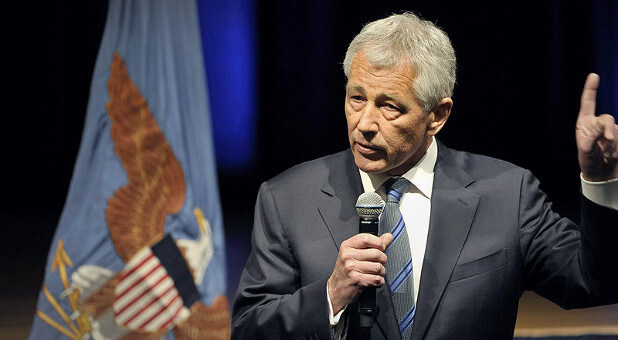After surviving a bruising confirmation battle over allegations he was anti-Israel, this week new U.S. Defense Secretary Chuck Hagel made his first visit to the Jewish nation as Obama’s top military adviser.
Hagel got a formal military greeting by the Israeli Defense Forces and had seemingly cordial and productive meetings with Israel’s prime minister and president.
Hagel’s visit is just the latest by the Obama administration. Secretary of State John Kerry seems to live in the Middle East lately, and of course President Obama was here just weeks ago.
But Secretary Hagel didn’t just come to assure us he really doesn’t hate Israel as much as Republicans wanted us to believe during his confirmation hearings. He also came to bring us lots of gifts. According to the Times of Israel:
“The Israeli Air Force will receive advanced radar systems, missiles, refueling planes and V-22 planes, Hagel told reporters after a meeting with Defense Minister Moshe Ya’alon. The V-22 planes, which can take off vertically, are something no country outside the U.S. has, Hagel noted, adding that the aid package would vouchsafe Israel’s ‘military superiority over any enemy state, non-state or coalition,’ and expand its ability to operate far from the country.”
But interestingly, there was one piece of U.S. military hardware Hagel was not willing to share. According to The New York Times:
“The Israeli Air Force will not get bunker-busting bombs, which can pierce layers of cement at underground sites. These bombs are considered integral to a successful attack on Iran’s underground nuclear facilities.”
It’s not clear if Israel had requested the bombs again (we were denied them in the past), and it’s true that at this point the Israeli Air Force does not currently posses jets capable of carrying the bombs. But it’s strange that the one piece of technology we surely need to destroy Iran’s underground nuke facilities, the U.S. isn’t selling to us.
All in all, Hagel’s inaugural trip was a mixed bag. He curiously seemed stupefied by Israeli confirmation of chemical weapons use by Syria—something that President Obama said would be a “game-changer” in terms of U.S. involvement in the Syrian civil war.
After leaving Israel to meet with Egyptian officials, Hagel was asked about reports that Israel had confirmed that Syria did indeed use chemical weapons on its own people.
Hagel’s response, according to the Associated Press, was that “Washington is looking for ‘real intelligence’ on the issue of Syrian chemical weapon use.”
“Suspicions are one thing. Evidence is another,” he said. “I think we have to be very careful here before we make any conclusions, draw any conclusions, based on real intelligence.”
Hagel said his comments should not be interpreting as questioning the validity of other countries’ intelligence on Syria. The important point, he said, is that “the United States relies on its own intelligence—and must.”
Still, there were encouraging moments. Hagel visited the Yad Vashem Holocaust Memorial center, and during his meeting with Prime Minister Netanyahu, Hagel said:
“Israel is a model for the world, and the relationship between our two countries … is as strong as it’s ever been.”
For now, I guess we’ll have to take him at his word.











































